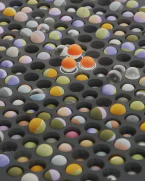Gratitude's Overcoming Power

Discover the Power of Gratitude: Why Kissing Your Brain Might Be a Good Idea
As a middle school science teacher, I always wanted my students to appreciate the work they put in and feel grateful for their ability to learn. One day, I visited my friend’s kindergarten class where I witnessed a cute and simple practice - she asked her students to kiss their brains to show gratitude for their learning. Inspired by this, I started asking my own students to kiss their brains too, which turned out to be a fun ritual in my classroom.
After teaching middle school, I pursued a Ph.D. in psychology, focusing on positive psychology, which explores the strengths and factors that allow individuals and communities to thrive. As a psychology teacher, my favorite unit to teach was the brain, but I thought it might be too childish to ask my college students to kiss their brains. However, several years later, after a brain tumor diagnosis and a near-death experience, I found myself kissing my brain for the first time since my middle school teaching days.
Kissing my brain became my mantra, and it helped me focus on gratitude rather than fear or anger towards my own body. As I continued to practice gratitude, I discovered that it not only helped me restructure my vision of illness and disability but also had actual physical benefits, such as a stronger immune system and less pain.
In this blog post, I want to share with you the power of gratitude and how practicing it, in small ways such as kissing your brain or writing thank-you notes, can wire your brain to help you build toughness in times of adversity.
My Path to Psychology Research: From Teaching to Studying Toughness
After teaching science in middle school, I decided to pursue a Ph.D. in psychology and specialize in positive psychology, a field that explores how individuals and communities thrive. My passion for teaching continued, and I found joy in teaching psychology to undergrad and high school students.
As a psychology teacher, I was particularly interested in the brain and its functions. However, when I was diagnosed with a brain tumor and had to undergo surgery, my interest in the brain took on a personal significance.
During my recovery, I tried to understand what I was struggling with the most and looked back on all the things I had been writing about this experience. I realized that gratitude was the key to restructuring my vision of illness and disability. My knowledge and research in positive psychology allowed me to apply well-being practices to my own life, which helped me cope with the challenges of my diagnosis.
In this blog post, I want to share with you my personal journey from teaching science to studying toughness and the positive effects of gratitude on our brain and overall well-being.
My Terrifying Experience: Discovering a Brain Tumor
After experiencing a terrible migraine and blurred vision, I saw multiple doctors and had an MRI that revealed a large mass in the right hemisphere of my brain. As someone who had been fascinated by the brain and its functions, I was both excited and scared to see the images of my own brain. The neurologist ordered an emergency visit to the ER, and I saw the image for the first time.
I was diagnosed with an anaplastic astrocytoma, and the following weeks were very difficult. I was introduced to the fight narrative, a popular mindset that is supposed to enable people with a diagnosis, but I found it to be too heavy and burdensome. Instead, I chose to focus on gratitude and well-being practices that I had learned and taught in psychology.
Gratitude became my tool to cope with the trauma of my diagnosis and to restructure my vision of illness and disability. I kissed my brain every day, thanking it for the amazing work it did, and I wrote thank-you notes to my medical team, who were my heroes in healthcare.
In this blog post, I want to share with you my experience of discovering a brain tumor and how it taught me the power of gratitude and the importance of building toughness in times of adversity.
Rejecting the “Fight Narrative”: Finding Gratitude Instead
After my brain tumor diagnosis, I was constantly told to “keep fighting” and “beat this tumor.” While I understand that some people find this mindset enabling, I found it to be too much. I didn’t want to think of my body as a battlefield, and I didn’t want to name my tumor something awful because it was going to be my neighbor for the rest of my life.
Instead, I chose to focus on gratitude and well-being practices that I had learned and taught in psychology. I started to incorporate gratitude exercises into my daily life, like writing down three things I’m grateful for every morning and thanking my medical team for their hard work.
Gratitude became my tool to cope with the trauma of my diagnosis and to restructure my vision of illness and disability. I focused on the amazing things my body was doing despite the trauma and thanked my brain for all the amazing work it did.
Research has shown that gratitude has several positive psychological and social outcomes, like increasing happiness and decreasing depression. But what’s interesting is that it also has physical outcomes, like strengthening our immune system and reducing pain. When we express gratitude, our brain releases dopamine and serotonin, two important neurotransmitters responsible for our emotions and mood.
In this blog post, I want to share with you my experience of rejecting the “fight narrative” and finding gratitude instead. I want to encourage you to practice gratitude and well-being practices in your own life, and show you how these practices can help build toughness and restructure your vision of adversity.
The Science of Gratitude and Its Physical Benefits
Research has shown that practicing gratitude has several positive psychological and social outcomes, but it also has physical outcomes. Gratitude can actually help strengthen our immune system and reduce pain.
When we express gratitude, our brain releases dopamine and serotonin, two important neurotransmitters responsible for our emotions and mood. These neurotransmitters can help us regulate stress hormones, leading to reduced inflammation in the body.
Studies have also shown that expressing gratitude can increase heart rate variability, which is a marker of good heart health. Gratitude has been linked to better sleep quality and duration, which is important for overall health and well-being.
Gratitude can also activate several parts of our brain and neural pathways associated with the management of negative emotions. When we practice gratitude, we can cognitively restructure potentially harmful thoughts to better manage our circumstances.
The more we practice gratitude, the easier it becomes to stimulate these neural pathways and the stronger they become. Gratitude is something that anyone can practice and get better at over time, and it can have significant physical and mental health benefits.
In this blog post, I want to encourage you to incorporate gratitude practices into your daily life and show you the science behind the physical benefits of gratitude. By practicing gratitude, we can wire our brains to help us build toughness and cope with adversity.
The Power of Practicing Gratitude in Times of Adversity
Practicing gratitude can be particularly powerful during times of adversity. By focusing on what we are grateful for, we can reframe our perspective and find more positivity in difficult situations.
When facing a serious illness or other challenges, it can be easy to focus on the negative aspects of our situation. But by intentionally focusing on the things we are grateful for, we can shift our mindset and find a sense of peace and acceptance.
For example, when dealing with a serious illness, we might focus on the gratitude we have for our medical team, or for the love and support of our friends and family. We can also focus on the things our body is still able to do, rather than solely on its limitations.
Research has shown that expressing gratitude can lead to increased levels of positive emotions and decreased levels of negative emotions. It can also improve our relationships and help us find more meaning and purpose in our lives.
Incorporating gratitude practices into our daily routines can help us build toughness and cope with adversity. Whether it’s writing down three things we are grateful for each day, or simply taking a moment to express gratitude when we wake up in the morning, these small actions can have a big impact on our mental and physical health.
In this blog post, I encourage you to find ways to practice gratitude in your own life, particularly during times of adversity. By doing so, you may find that you are able to reframe your perspective and find more positivity and peace, even in the midst of difficult circumstances.
Building Toughness Through Gratitude: My Personal Experience
Gratitude can be a powerful tool for building toughness during difficult times. By intentionally focusing on the things we are grateful for, we can reframe our mindset and find more positivity and peace, even in the midst of adversity.
Many people, including myself, have found that practicing gratitude can be particularly helpful during times of illness or other challenges. By focusing on what we are grateful for, we can shift our focus away from the negative aspects of our situation and find more joy and meaning in our lives.
Incorporating gratitude practices into my daily routine has been a key part of my own journey with a brain tumor. I have found that by focusing on the things I am grateful for, such as my medical team and the love and support of my friends and family, I am better able to cope with the challenges that come my way.
Research has shown that expressing gratitude can have numerous physical and mental health benefits, including increased levels of positive emotions, decreased levels of negative emotions, and a stronger immune system. By intentionally practicing gratitude, we can actually rewire our brains to help us build toughness and better manage adversity.
I encourage you to explore different gratitude practices and find what works best for you. Whether it’s writing down three things you are grateful for each day, or simply taking a moment to express gratitude when you wake up in the morning, these small actions can have a big impact on your mental and physical health.
In conclusion, building toughness through gratitude is a powerful tool that can help us cope with adversity and find more joy and meaning in our lives. By intentionally focusing on the things we are grateful for, we can reframe our perspective and find more positivity and peace, even in the midst of difficult circumstances.
Kiss Your Brain: A Practice of Gratitude and Self-Love
At the end of the video script, the speaker shares how she continues to practice gratitude and self-love, even during difficult times. She emphasizes the importance of acknowledging and thanking our bodies for all that they do for us. The speaker encourages us to develop our own gratitude practices and to intentionally activate the gratitude circuits in our brain, as it can help us build toughness and manage our circumstances better.
The speaker also mentions how she started asking her middle school students to “kiss their brains” as a practice of gratitude for all the work they did in class. She later adopted this practice herself after discovering a brain tumor and found it to be a powerful way of expressing gratitude and self-love. By kissing her brain, the speaker is acknowledging and thanking her brain for its toughness and strength during a difficult time.
The practice of kissing your brain is a simple but powerful way to grow gratitude and self-love. By recognizing and thanking our bodies for all that they do for us, we can shift our perspective towards positivity and toughness. It’s a practice that anyone can adopt, and with time and repetition, it can become a natural part of our daily routine.
Conclusion
In this post, we explored the practice of gratitude and how it can be a powerful tool for building toughness during times of adversity. We learned about the journey of an individual who went from being a middle school science teacher to a psychology researcher, only to discover that she had a brain tumor. Despite the fear and uncertainty that came with this diagnosis, she rejected the “fight narrative” often associated with illness and instead turned to gratitude as a way of coping.
Through this personal experience, we also learned about the science behind gratitude and its physical and psychological benefits. We discovered that practicing gratitude can help activate specific neural pathways in our brain, making it easier for us to experience positive emotions and regulate stress hormones. We also learned that gratitude can have physical benefits, such as boosting our immune system and reducing pain.
Furthermore, we saw how gratitude can be a transformative tool for reframing our perspective and growing self-love. By focusing on the gratitude for our bodies and the things that they can do, rather than dwelling on the challenges we face, we can find a sense of peace and appreciation.
The practice of gratitude is not just limited to individuals with health challenges, but it can be beneficial to everyone. Whether we take the time to write thank-you notes, reflect on the things we’re grateful for, or simply kiss our brains in appreciation, incorporating gratitude into our daily lives can have a powerful impact on our well-being.
In conclusion, let us hug gratitude as a tool for toughness and self-love, and let us always take a moment to appreciate the amazing things that our bodies and minds can do.
















